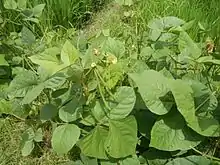ماش
See also: ماس
Arabic
.jpg.webp)
مُشَاةٌ
Etymology 1
Derived from the active participle of مَشَى (mašā, “to walk”), from the root م ش ي (m-š-y).
Noun
مَاشٍ • (māšin) m (construct state مَاشِي (māšī), plural مَاشُونَ (māšūna) or مُشَاة (mušāh), feminine مَاشِيَة (māšiya))
- pedestrian
- foot soldier; (in the plural) infantry
- كان المشاة من المناوشين والسيافين ― the infantry was (composed of) skirmishers and swordmen
- (Can we verify(+) this sense?) narrator

مَاش
Declension
Declension of adjective مَاشٍ (māšin)
| Singular | Masculine | Feminine | ||||
|---|---|---|---|---|---|---|
| singular triptote in ـٍ (-in) | singular triptote in ـَة (-a) | |||||
| Indefinite | Definite | Construct | Indefinite | Definite | Construct | |
| Informal | مَاشِي māšī |
الْمَاشِي al-māšī |
مَاشِي māšī |
مَاشِيَة māšiya |
الْمَاشِيَة al-māšiya |
مَاشِيَة māšiyat |
| Nominative | مَاشٍ māšin |
الْمَاشِي al-māšī |
مَاشِي māšī |
مَاشِيَةٌ māšiyatun |
الْمَاشِيَةُ al-māšiyatu |
مَاشِيَةُ māšiyatu |
| Accusative | مَاشِيًا māšiyan |
الْمَاشِيَ al-māšiya |
مَاشِيَ māšiya |
مَاشِيَةً māšiyatan |
الْمَاشِيَةَ al-māšiyata |
مَاشِيَةَ māšiyata |
| Genitive | مَاشٍ māšin |
الْمَاشِي al-māšī |
مَاشِي māšī |
مَاشِيَةٍ māšiyatin |
الْمَاشِيَةِ al-māšiyati |
مَاشِيَةِ māšiyati |
| Dual | Masculine | Feminine | ||||
| Indefinite | Definite | Construct | Indefinite | Definite | Construct | |
| Informal | مَاشِيَيْن māšiyayn |
الْمَاشِيَيْن al-māšiyayn |
مَاشِيَيْ māšiyay |
مَاشِيَتَيْن māšiyatayn |
الْمَاشِيَتَيْن al-māšiyatayn |
مَاشِيَتَيْ māšiyatay |
| Nominative | مَاشِيَانِ māšiyāni |
الْمَاشِيَانِ al-māšiyāni |
مَاشِيَا māšiyā |
مَاشِيَتَانِ māšiyatāni |
الْمَاشِيَتَانِ al-māšiyatāni |
مَاشِيَتَا māšiyatā |
| Accusative | مَاشِيَيْنِ māšiyayni |
الْمَاشِيَيْنِ al-māšiyayni |
مَاشِيَيْ māšiyay |
مَاشِيَتَيْنِ māšiyatayni |
الْمَاشِيَتَيْنِ al-māšiyatayni |
مَاشِيَتَيْ māšiyatay |
| Genitive | مَاشِيَيْنِ māšiyayni |
الْمَاشِيَيْنِ al-māšiyayni |
مَاشِيَيْ māšiyay |
مَاشِيَتَيْنِ māšiyatayni |
الْمَاشِيَتَيْنِ al-māšiyatayni |
مَاشِيَتَيْ māšiyatay |
| Plural | Masculine | Feminine | ||||
| sound masculine plural | sound feminine plural; broken plural diptote in ـٍ (-in) | |||||
| Indefinite | Definite | Construct | Indefinite | Definite | Construct | |
| Informal | مَاشِين māšīn |
الْمَاشِين al-māšīn |
مَاشِي māšī |
مَاشِيَات; مَوَاشِي māšiyāt; mawāšī |
الْمَاشِيَات; الْمَوَاشِي al-māšiyāt; al-mawāšī |
مَاشِيَات; مَوَاشِي māšiyāt; mawāšī |
| Nominative | مَاشُونَ māšūna |
الْمَاشُونَ al-māšūna |
مَاشُو māšū |
مَاشِيَاتٌ; مَوَاشٍ māšiyātun; mawāšin |
الْمَاشِيَاتُ; الْمَوَاشِي al-māšiyātu; al-mawāšī |
مَاشِيَاتُ; مَوَاشِي māšiyātu; mawāšī |
| Accusative | مَاشِينَ māšīna |
الْمَاشِينَ al-māšīna |
مَاشِي māšī |
مَاشِيَاتٍ; مَوَاشِيَ māšiyātin; mawāšiya |
الْمَاشِيَاتِ; الْمَوَاشِيَ al-māšiyāti; al-mawāšiya |
مَاشِيَاتِ; مَوَاشِيَ māšiyāti; mawāšiya |
| Genitive | مَاشِينَ māšīna |
الْمَاشِينَ al-māšīna |
مَاشِي māšī |
مَاشِيَاتٍ; مَوَاشٍ māšiyātin; mawāšin |
الْمَاشِيَاتِ; الْمَوَاشِي al-māšiyāti; al-mawāšī |
مَاشِيَاتِ; مَوَاشِي māšiyāti; mawāšī |
.jpg.webp)
مَاش
Noun
مَاش • (māš) m (collective, singulative مَاشَة f (māša))
Declension
Declension of noun مَاش (māš)
| Collective | basic collective triptote | ||
|---|---|---|---|
| Indefinite | Definite | Construct | |
| Informal | مَاش māš |
الْمَاش al-māš |
مَاش māš |
| Nominative | مَاشٌ māšun |
الْمَاشُ al-māšu |
مَاشُ māšu |
| Accusative | مَاشًا māšan |
الْمَاشَ al-māša |
مَاشَ māša |
| Genitive | مَاشٍ māšin |
الْمَاشِ al-māši |
مَاشِ māši |
| Singulative | singulative triptote in ـَة (-a) | ||
| Indefinite | Definite | Construct | |
| Informal | مَاشَة māša |
الْمَاشَة al-māša |
مَاشَة māšat |
| Nominative | مَاشَةٌ māšatun |
الْمَاشَةُ al-māšatu |
مَاشَةُ māšatu |
| Accusative | مَاشَةً māšatan |
الْمَاشَةَ al-māšata |
مَاشَةَ māšata |
| Genitive | مَاشَةٍ māšatin |
الْمَاشَةِ al-māšati |
مَاشَةِ māšati |
| Dual | Indefinite | Definite | Construct |
| Informal | مَاشَتَيْن māšatayn |
الْمَاشَتَيْن al-māšatayn |
مَاشَتَيْ māšatay |
| Nominative | مَاشَتَانِ māšatāni |
الْمَاشَتَانِ al-māšatāni |
مَاشَتَا māšatā |
| Accusative | مَاشَتَيْنِ māšatayni |
الْمَاشَتَيْنِ al-māšatayni |
مَاشَتَيْ māšatay |
| Genitive | مَاشَتَيْنِ māšatayni |
الْمَاشَتَيْنِ al-māšatayni |
مَاشَتَيْ māšatay |
| Paucal (3-10) | sound feminine paucal | ||
| Indefinite | Definite | Construct | |
| Informal | مَاشَات māšāt |
الْمَاشَات al-māšāt |
مَاشَات māšāt |
| Nominative | مَاشَاتٌ māšātun |
الْمَاشَاتُ al-māšātu |
مَاشَاتُ māšātu |
| Accusative | مَاشَاتٍ māšātin |
الْمَاشَاتِ al-māšāti |
مَاشَاتِ māšāti |
| Genitive | مَاشَاتٍ māšātin |
الْمَاشَاتِ al-māšāti |
مَاشَاتِ māšāti |
Further reading
 بقلة الماش on the Arabic Wikipedia.Wikipedia ar
بقلة الماش on the Arabic Wikipedia.Wikipedia ar- Dozy, Reinhart Pieter Anne (1881), “ماش”, in Supplément aux dictionnaires arabes (in French), volume 2, Leiden: E. J. Brill, page 624
Moroccan Arabic
Pronunciation
- IPA(key): /maːʃ/
Ottoman Turkish
Descendants
- Turkish: maş
Persian
Noun
ماش • (mâš)
- mung bean (Vigna radiata, ماش سبز (mâš sabz)) and mungo bean Vigna mungo, ماش سیاه (mâš siyâh))
Descendants
References
- Ačaṙean, Hračʿeay (1977), “մաշ”, in Hayerēn armatakan baṙaran [Armenian Etymological Dictionary] (in Armenian), volume III, 2nd edition, a reprint of the original 1926–1935 seven-volume edition, Yerevan: University Press, page 258
- Vullers, Johann August (1856–1864), “ماش”, in Lexicon Persico-Latinum etymologicum cum linguis maxime cognatis Sanscrita et Zendica et Pehlevica comparatum, e lexicis persice scriptis Borhâni Qâtiu, Haft Qulzum et Bahâri agam et persico-turcico Farhangi-Shuûrî confectum, adhibitis etiam Castelli, Meninski, Richardson et aliorum operibus et auctoritate scriptorum Persicorum adauctum (in Latin), volume II, Bonn: Adolf Marcus, page 1118b
Ushojo
This article is issued from Wiktionary. The text is licensed under Creative Commons - Attribution - Sharealike. Additional terms may apply for the media files.